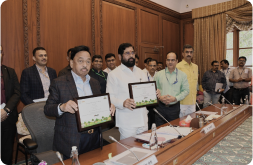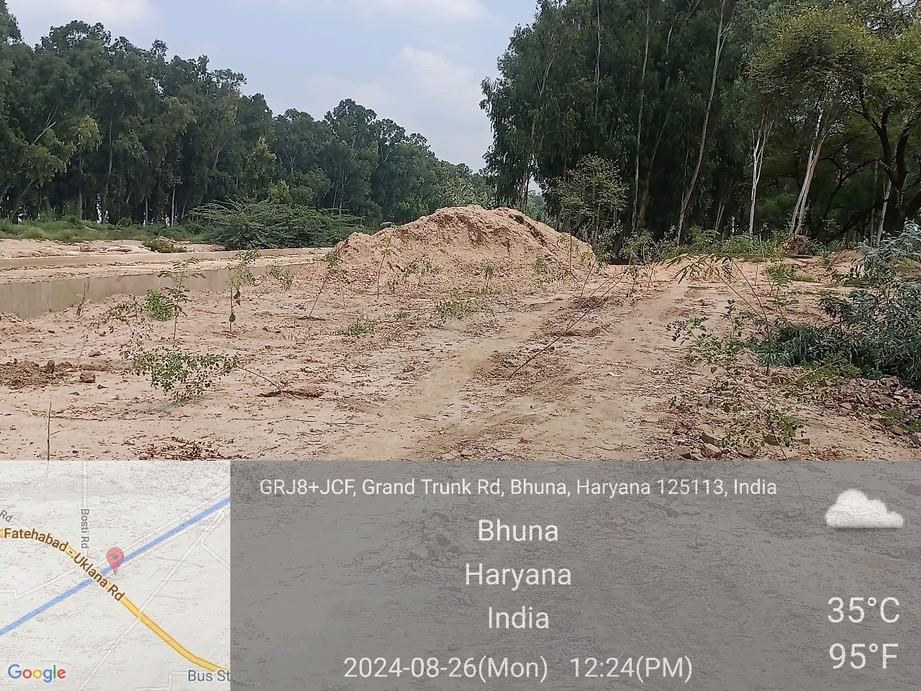










Project Target
0% Remaining
25,000
Trees Planted out of 25,000 Trees

Project Location:
In 2024–2025, 25,000 trees was planted across Nawagaon, Bhaini, Iserheri, Khedar, Sangwa Khas, Balak and Saniyana villages of Hisar district, Haryana.
Project Aim
SDG
Why Trees?
Environmental issues in Hisar, Haryana include insecticide contamination of soil and water (Kumari et al., 2007), air pollution from crop residue burning (Saxena et al., 2021), and drinking water contamination with pesticide residues (Kaushik et al., 2011). These problems contribute to challenges such as water scarcity, pollution, and deforestation.[1] Planting trees can help address these environmental challenges in Hisar. Tree planting initiatives have the potential to mitigate air pollution by absorbing pollutants and releasing oxygen.[2] Trees can also aid in reducing soil erosion, improving water quality, and providing habitat for biodiversity, thus addressing issues related to insecticide contamination and pesticide residues.
Planting trees in Hisar, Haryana can significantly benefit both wildlife and communities in the region. The area faces challenges such as habitat loss, reduced biodiversity, and limited green spaces.[3] By planting trees, wildlife habitats can be restored and expanded, providing shelter, food sources, and breeding grounds for various species. Trees play a crucial role in supporting wildlife populations by offering nesting sites, protection from predators, and promoting biodiversity.
Furthermore, tree planting initiatives can enhance the overall well-being of communities in Hisar. Trees contribute to improving air quality, reducing noise pollution, and creating aesthetically pleasing environments.[4] Additionally, trees can help mitigate the impacts of climate change by sequestering carbon, regulating temperatures.
Tree Species
The tree species selected for this tree plantation project are native to the area and hold not only ecological but also economic value.
Indian trees have long provided people with medicinal benefits and high-quality wood. The project involved the plantation of Neem (Azardirachta indica), which is known for its excellent wood, and is also renowned for its medicinal benefits. Papdi (Holoptelea integrifolia), is known for its medicinal properties. Jangal jalebi species (Pithecellobium dulce) is known for its sweet, edible pulp and is often frown as a shade tree and livestock fodder. Similarly, Shisham wood (Dalbergia sissoo), with its innate resistance to decay and warping, is popularly used for woodcarving and making kitchenware products. It provides excellent resistance to dry-wood termites and is known for its durability. Tut (Morus alba) is a sweet edible fruit and is valued in traditional medicine. Pahari kikkar (Vachelia nilotica) is known for its medicinal properties and hardwood timber. Finally, Burma Dek/Bakain (Melia azedarach), a tree with great wood, is highly valued for its durability and aesthetic appeal. It is also known for its resistance to decay and pests, making it a long-lasting and sustainable option.
Social Impact
This project does not only strive to safeguard the wildlife but also brings tremendous socio-economic benefits to the surrounding communities. Trees benefit the communities through fresh air, aesthetics and by cooling during the hot summers. A variety of birds and animals find shelter and nourishment in trees. Planting trees aids to protect wildlife habitat in order to promote conservation and prevent wildlife from entering human settlements, hence preventing human-animal conflict. Thus, the planted species serve primary purposes such as animal repellent, fodder source, livelihood diversification, and biodiversity benefits. The plantation project is speculated to create workdays for the rural and tribal communities of Hisar region, including women. Indigenous communities are the ones that know their forests the best and that’s why they are encouraged to get involved in plantation activities starting from the pit digging process to their maintenance after the maturity of trees.
As a result, planting of trees aims to value standing forests, protect wildlife, work toward afforestation programmes, control the dynamics of resource extraction from the forests, and provide local residents with alternate sources of energy and subsistence. The plantation of trees in the Hisar region can create forest assets for the community in the form of fruits, fodder, fuelwood, and other NTFPs. Subsequently, planting adds to the global endeavour to reduce greenhouse gas emission. In addition to that planting trees helps cultivate a culture of environmental responsibility and community left in the citizens, enhancing sustainable living.
[1] Kumari, B., Madan, V., & Kathpal, T. (2007). Status of insecticide contamination of soil and water in haryana, india. Environmental Monitoring and Assessment, 136(1-3), 239-244.
Saxena, P., Sonwani, S., Srivastava, A., Jain, M., Srivastava, A., Bharti, A., … & Bhardwaj, S. (2021). Impact of crop residue burning in haryana on the air quality of delhi, india. Heliyon, 7(5), e06973.
Kaushik, C., Sharma, H., & Kaushik, A. (2011). Organochlorine pesticide residues in drinking water in the rural areas of haryana, india. Environmental Monitoring and Assessment, 184(1), 103-112.
[2] Brancalion, P. and Holl, K. (2020). Guidance for successful tree planting initiatives. Journal of Applied Ecology, 57(12), 2349-2361.
[3] Panghal, M., Arya, V., Yadav, S., Kumar, S., & Yadav, J. (2010). Indigenous knowledge of medicinal plants used by saperas community of khetawas, jhajjar district, haryana, india. Journal of Ethnobiology and Ethnomedicine, 6(1).
Narango, D., Tallamy, D., & Marra, P. (2018). Nonnative plants reduce population growth of an insectivorous bird. Proceedings of the National Academy of Sciences, 115(45), 11549-11554.
[4] Widney, S., Fischer, B., & Vogt, J. (2016). Tree mortality undercuts ability of tree-planting programs to provide benefits: results of a three-city study. Forests, 7(12), 65.
Social Impact of Growing Trees
Community Engagement
Tree planting initiatives often involve local communities, which can lead to greater community cohesion.
Ecological Education
Provides opportunities for community members, especially children, about the importance of environmental sustainability.
Urban Beautification
Trees contribute to the aesthetic enhancement of urban areas, making cities more pleasant and liveable.
Climate Resilience
By improving green cover, tree planting helps make communities more resilient against climate impacts like heatwaves.
Employment Creation
Planting trees creates employment for local community members like planting and maintenance, administrative roles, and more long-term jobs in management.
Wildlife Habitat
Trees provide critical habitats for various species of wildlife. Enhancing tree cover helps preserve biodiversity, which can be an ecological boon for local communities
Copyrights @ 2025 All rights reserved by Pangea EcoNetAssets Pvt Ltd.